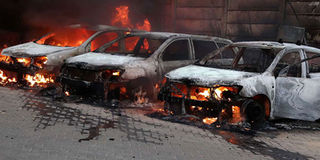Families of terrorism suspects live in fear, face stigma

Vehicles bombed by terrorists at Dusit complex in Nairobi on January 15, 2019. PHOTO | JEFF ANGOTE | NATION MEDIA GROUP
What you need to know:
- The families defended their kin claiming they were innocent and in danger due to the negative exposure.
- Mr Abdi Bidu, Boru's father, regretfully said his son had attempted to cross over to Somalia in 2017 before he was intercepted.
Every time there is a terrorist attack in the country, the family of Mr Stephen Wachira Ngariko cannot help but cringe at the thought that their kin might have been involved.
Sometimes what worries them most is the stigma each attack brings, especially now that they have been labelled “Al-Shabaab family”.
For the families whose children have attempted to cross over to Somalia to join Al-Shabaab or are linked to terrorism, life has not been the same.
The effects range from trauma, betrayal, frustration, fear, harassment and abandonment by friends and relatives.
In Isiolo, families of three men listed by police as most wanted, but surrendered to the Directorate of Criminal Investigations (DCI) on Monday, spoke of the impact of their kin’s alleged link to terrorism.
MOST WANTED
Parents and relatives of the suspects - Abdi Ali Kanchora, Boru Abdi Bidu and Ramadhan Wario Bonaya - said they were distressed when they saw images and names of their kin on television and newspapers describing them as armed and dangerous as well as most wanted fugitives, yet they had been with their families all along.
While refuting the reports, the parents said they were in agony since the reports of their children circulated, expressing frustration as they hung around the DCI offices in Isiolo watching their kin being interrogated.
Following news that the suspects were being hunted by police, the families defended their kin in front of cameras for journalists to exonerate them, claiming they were innocent and in danger due to the negative exposure.
Mr Abdi Bidu, Boru's father, regretfully said his son had attempted to cross over to Somalia in 2017 before he was intercepted.
“My son has since reformed; he was charged and acquitted. Why did his name and photo appear in that list if he had been exonerated?” He asked.
IMAGE
He said the three men were not fugitives since they had been mingling with people and leading normal lives in Isiolo to a point of helping the government with information since they were required to appear at the Anti-Terrorism Police Unit (ATPU) offices on a monthly basis.
The link, Mr Bidu said, had also tarnished the family's name and it would take long for them to go back to normal.
Ms Halima Boru, Kanchora’s mother, said she was shocked and has since been subjected to emotional torture since news broke out that her son was among those being hunted by police.
Kanchora was planning his wedding slated for February 9 when he received a call from his mother that he was being sought.
SAFETY
Ms Boru said her son, who sells second hand clothes, was mistakenly arrested on terrorism suspicion three years ago.
“It was painful and shocking to see my son’s picture among those listed on TV on Sunday night, I haven’t been able to eat anything. We had to call members of community policing to protect us due to fear after the revelation,” Ms Boru said.
For the family of Stephen Wachira Ngariko who hails from Gichugu, Kirinyaga County, they can barely show up in public or sleep peacefully whenever terrorism is a topic because they are afraid of who might be listening or watching.
ARREST
Their troubles started after viral social media reports last year claimed that Wachira, or Chira, as he is popularly known, was arrested by Somali forces in Dhobley over links to Al-Shabaab terrorist group.
The reports claimed that the former NYS cohort and two unidentified Tanzanians were attempting to sneak back into Kenya to execute an attack in Nairobi.
Photos purporting the arrest emerged on social media in February last year.
Even though they are still in the dark about the reports, they have been subjected to stigma from neighbours who now link them to terrorists.





